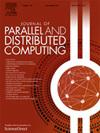异构mpsoc上航空电子安全关键任务的热建模和优化分配
IF 3.4
3区 计算机科学
Q1 COMPUTER SCIENCE, THEORY & METHODS
引用次数: 0
摘要
多处理器片上系统(MPSoC)可以提供包括航空航天在内的许多工业领域所需的高性能。然而,它们的高功耗,加上航空电子安全标准,带来了新的热管理挑战。本文研究了在航空电子设备中需要的以固定时钟频率运行的异构mpsoc上的周期性任务的离线热感知分配技术。目标是找到任务分配到(i)核心和(ii)时间隔离窗口,如ARINC 653标准所要求的,同时最小化MPSoC温度。为了实现这一目标,我们提出了一个新的优化问题,我们推导了它的np -硬度,并确定了它的子问题在多项式时间内可解。此外,我们提出并分析了三种幂模型,并将它们集成到基于启发式、黑盒优化器和整数线性规划(ILP)的几种新型优化方法中。我们在三种流行的MPSoC平台(NXP i.MX8QM MEK, NXP i.MX8QM Ixora, NVIDIA TX2)上进行了实验评估,并观察到测试方法之间的差异高达5.5°C(对应于环境温度降低22%)。我们还表明,我们的方法将经验功率模型与ILP相结合,在所有测试平台上都优于其他方法。本文章由计算机程序翻译,如有差异,请以英文原文为准。
Thermal modeling and optimal allocation of avionics safety-critical tasks on heterogeneous MPSoCs
Multi-Processor Systems-on-Chip (MPSoC) can deliver high performance needed in many industrial domains, including aerospace. However, their high power consumption, combined with avionics safety standards, brings new thermal management challenges. This paper investigates techniques for offline thermal-aware allocation of periodic tasks on heterogeneous MPSoCs running at a fixed clock frequency, as required in avionics. The goal is to find the assignment of tasks to (i) cores and (ii) temporal isolation windows, as required in ARINC 653 standard, while minimizing the MPSoC temperature. To achieve that, we formulate a new optimization problem, we derive its NP-hardness, and we identify its subproblem solvable in polynomial time. Furthermore, we propose and analyze three power models, and integrate them within several novel optimization approaches based on heuristics, a black-box optimizer, and Integer Linear Programming (ILP). We perform the experimental evaluation on three popular MPSoC platforms (NXP i.MX8QM MEK, NXP i.MX8QM Ixora, NVIDIA TX2) and observe a difference of up to 5.5 °C among the tested methods (corresponding to a 22% reduction w.r.t. the ambient temperature). We also show that our method, integrating the empirical power model with the ILP, outperforms the other methods on all tested platforms.
求助全文
通过发布文献求助,成功后即可免费获取论文全文。
去求助
来源期刊

Journal of Parallel and Distributed Computing
工程技术-计算机:理论方法
CiteScore
10.30
自引率
2.60%
发文量
172
审稿时长
12 months
期刊介绍:
This international journal is directed to researchers, engineers, educators, managers, programmers, and users of computers who have particular interests in parallel processing and/or distributed computing.
The Journal of Parallel and Distributed Computing publishes original research papers and timely review articles on the theory, design, evaluation, and use of parallel and/or distributed computing systems. The journal also features special issues on these topics; again covering the full range from the design to the use of our targeted systems.
 求助内容:
求助内容: 应助结果提醒方式:
应助结果提醒方式:


